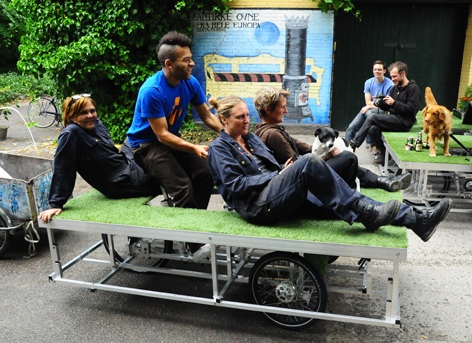PARKCYCLE SWARM
|
|
|
|
| SWARMING, Copenhagen 2013 |
Introduction:
The PARKCYCLE SWARM is a modular system that empower persons to build an instant public park whenever and
wherever they want to. The PARKCYCLE SWARM consists of a number of human powered mobile gardens. The
individual gardens can be combined to form public parks. A PARKCYCLE SWARM can consist of any number of
individual gardens
Areas normally used by cars like parking lots or roads in general can be reclaimed and used for non polluting
peaceful social activities instead. Each vehicle has been designed to comply with local bicycle standards. The
version showed in this manual fits the EU standards of bicycle design. Adaptations to local regulations in
other parts of the world may be necessary and can influence the size of each individual cycle.
The PARKCYCLE SWARM can be seen as a DIY urban planning tool as an alternative to the top down urban planning
that dominates most cities in the world. N55 encourage persons to build their own cycles and form PARKCYCLE
SWARMS and hereby influence their local urban environments.
The PARKCYCLE SWARM is a collaboration between N55, Till Wolfer and John Bela
from the Rebar group

Background:
We find ourselves in a situation where large concentrations of power determines the layout of our urban
environments in most places in the world. Most architects, urban planners, designers, artists etc are more
than willing to work for these concentrations of power despite the fact that these concentrations of power do
not necessarily respect the rights of persons.
Concentrations of power do not always respect the rights of persons. If one denies this fact one gets:
concentrations of power always respect the rights of persons. This does not correspond with our experiences.
Concentrations of power characterize our society. Concentrations of power force persons to concentrate on
participating in competition and power games, in order to create a social position for themselves. Concurrent
with the concentrations of power dominating our conscious mind and being decisive to our situations, the
significance of our fellow humans diminishes. And our own significance becomes the significance we have for
concentrations of power, the growth of concentrations of power, and the conflicts of concentrations of
power.
It is clear that persons should be consciously aware of the rights of persons and therefore must seek to
organize the smallest concentrations of power possible. This is also the case when it comes to urban
planning.
N55 suggests that we find a different approach to urban planning and take into consideration what is right and
wrong
Intelligent urban design would require the design of systems which adjust themselves to the persons who live
in them and to their needs. Unlike a top-down master plan, such systems gradually dissolve themselves as the
inhabitants take over and transform their city according to their needs and desires. Based on collaboration,
cooperation and diversity, intelligent cities acknowledge that we are social beings needing space for being
different
It is possible to let the growth of the city be framed by simple rules, which allows people to freely develop
their own environments and systems
N55 propose a critical approach to city design by daring to give the inhabitants real and meaningful influence
on the form and function of their city, and by using friendly technologies, which allows our urban environment
to exist in symbiosis with our planet rather than as a parasite.
A potential revolutionary change of our urban environments lies simply in distributing power.
The PARKCYCLE SWARM should be seen as part of the ongoing research by N55 to find new methods of sharing our
urban environments.

John Bela working on the PARKCYCLE SWARM in N55`s studio, Copenhagen 2013
Construction:
The PARKCYCLE SWARM construction is based on the Open Source system XYZ SPACEFRAME VEHICLES by N55 and is
inspired by Rebars park cycle concept from 2005. N55 proposed to make a lightweight, DIY, modular version of
the park cycle working as a swarm instead of making one single large cycle, when invited by Rebar to
collaborate.

XYZ SPACEFRAME VEHICLES enable persons to build their own vehicles. ( learn more about the XYZ
SPACEFRAME VEHICLES construction method at http://n55.dk/MANUALS/SPACEFRAMEVEHICLES/spaceframevehicles.html).
The individual parkcycles are based on the XYZ CARGO model. A platform has been added that defines the mobile
land used for the individual gardens. The designs of XYZ SPACEFRAME VEHICLES are Open Source provided under
the rules of Creative Commons ( Noncommercial — You may not use this work for commercial purposes. Any
use of the works must include proper credits to N55 and collaborator Till Wolfer and a link to http://N55.dk.
).


Romani interior
Extensions:
The PARKCYCLE SWARM could easily be equipped with small pavilions, trees, scenes, PA systems, solar panels and
batteries for energy production, portable grill, mobile kitchen etc.

Single cycle, Copenhagen 2013
Maintenance:
The amount of maintenance work is highly dependent on which plants are being used. The mechanical parts
require the same maintenance as a normal bicycle.

Fold out landscape serving as backrest
Technical specifications:
Dimensions:
Basic module:
Size: 0.80 m X 1.2 m x 2,25 m
Mass: 60kg
Max load: 250 kg including driver
Materials:
Aluminum
Plywood
Standard bicycle parts
Grass
Bolts and nuts
PARKCYCLE SWARM SITUATIONS:

Reclaiming parking space, Copenhagen 2013


SWARMING, Copenhagen 2013













Reclaiming Prinsessegade, Copenhagen 2013





Parking on the road next to the beach, Copenhagen 2013



By N55 and Till Wolfer in collaboration with the Rebar group
Thanks to Pete Moran
Thanks to the guys at Christianias Smedie for their assistance and collaboration on the XYZ SPACEFRAME
VEHICLES project.
Thanks to Steen, Esben, Mads, Anders and all the others for hanging out in the park etc...
Photos by Nicolai Fontain

